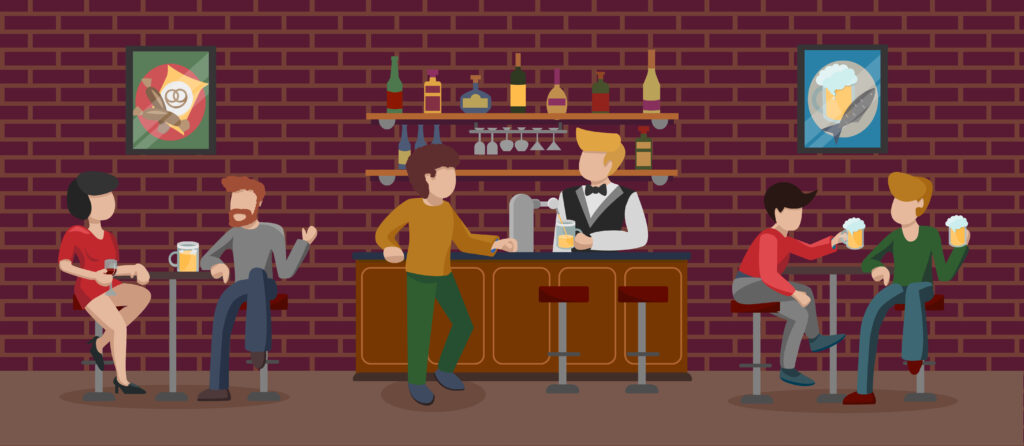Earlier this year a battle was fought in the leafy hills to the north of Wellington. A liquor license was being sought for what was once Dick Mead Motors and the Onslow Service Station. The resident’s association successfully applied for an extension to the decision period claiming the site was “highly visible” and near three schools, with children passing daily.
The license was being sought for a pub to be known as The Station Kitchen by a company related to the Waitoa Brewing Co in Hataitai. Another case of a demonic brewer trying to indoctrinate the youth of the nation, clearly.
Between its days as a service station and the new establishment, the characterful old building housed Automat, a burger and beer joint that hosted me on a couple of occasions to present nights of food and beer matching. The vibe was always cosy, warm and packed with community spirit. As cold autumnal mist descended on the hills outside, people sipped beer (non-alcoholic options were available), ate delicious food and chatted with their neighbours in a space that was neither their place of work nor their residence.
In the 1970’s American Sociologist Ray Oldenburg identified places one can inhabit that are neither about employment nor residence as the “third place”. Oldenburg identified bars, coffee shops, diners, general stores, lounges, taverns, saloons, doughnut shops, pool halls, bingo halls, lodges, and youth recreation centres as all being crucial to local democracy and community vitality, social cohesion and general happiness.

New Zealand has always had a difficult relationship with alcohol and pubs. For well over a century our temperance movement has sought to make our licensed venues worse — for it is only if they are the hellish places of the wowser’s imagination that there can be popular support to outlaw them.
From the voting of suburbs dry, to the Six O’Clock Swill to today’s curious position that children should not be able to see adults consuming alcohol responsibly, the forces of moral sobriety try to drive drinking into dark, squalid holes and out of normal public social life. It is telling that in a 2018 New Zealand Geographic editorial on the third place, Rebekah White didn’t even mention the possibility that a pub might offer a solution to this urban need. I suspect doing so would be deemed far too contentious.
Earlier this year I sat in pubs across England and in Scotland. In many of those pubs people from all walks of life sat, and responsibly imbibed alcohol while chatting with friends and neighbours.
In Hebden Bridge in the middle of the Pennines I visited a pub that is owned by members of the local community. It was my second time at the Fox and Goose, and on both my visits, the first in 2019, I was struck by how easily locals sat and talked with each other, how they set the world to rights, both the world of that tight deep valley and the world beyond.
In a pub in North London, I witnessed young mothers catching up over a pint, their toddlers playing happily by their side. They were clearly clutching a moment on a winter’s afternoon to have some adult company and decompress from the whirlwind of young family life. The good people of the resident’s association would have been shocked.
In 2019 I sat in the beer cafes of Brussels. There I saw little old men pop in on their way back from the markets on a Saturday morning for a quick Jupiler and some much-needed banter with the waiting staff. My French wasn’t up to the details, but the intent was clear in any language. In New Zealand this might be characterised as vulnerable elderly drinking in the mornings; in practise it was a moment of human contact and joviality.
Closer to home my favourite pubs of this land all have an element of community to them. At LBQ in Wellington, a corner is dedicated to older patrons and is decorated with pictures and dedications to those who have gone. Indeed, my first column of this series was about a funeral held within the pub. In Dunedin, Albar, Portsider and Inch Bar all provide meeting places for their vibrant local communities. Galbraith’s Ale House in Auckland is a shrine to sociability that attracts people to come together and meet despite the sprawling nature of that city.
I am not for a moment suggesting that every pub, bar or tavern offers this kind of experience. But the best ones do, and it does seem like the default position in New Zealand is to assume that they cannot provide any social good.
Thankfully the campaign against The Station Kitchen only succeeded in delaying the license. As you read this they are open and will, I am sure, be offering up beer and pizza in a family-friendly environment where the worst things that a passing impressionable child might witness is a rosy smile, a conversation lubricated by a shared beer, and people generally enjoying each other’s company in a third place.